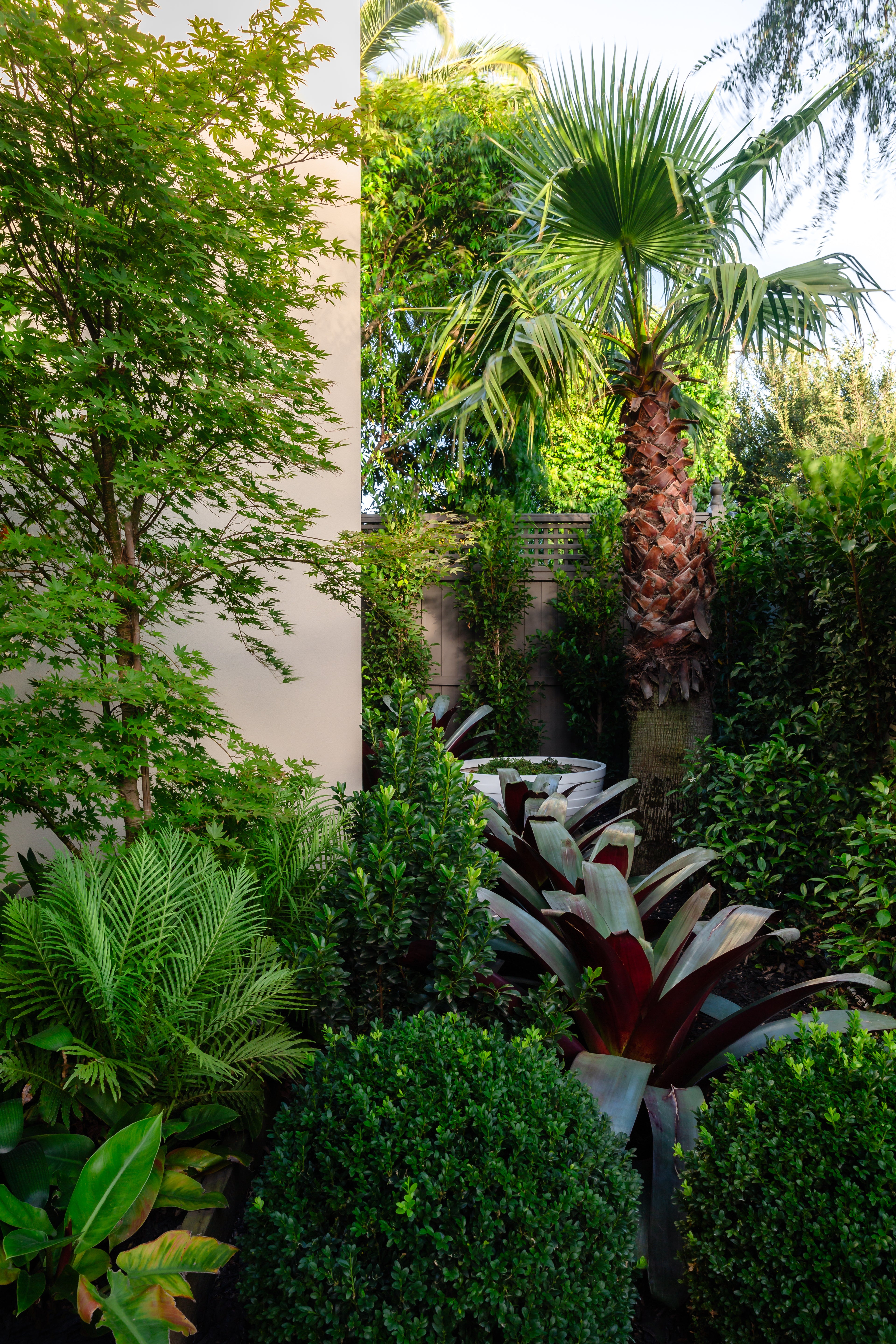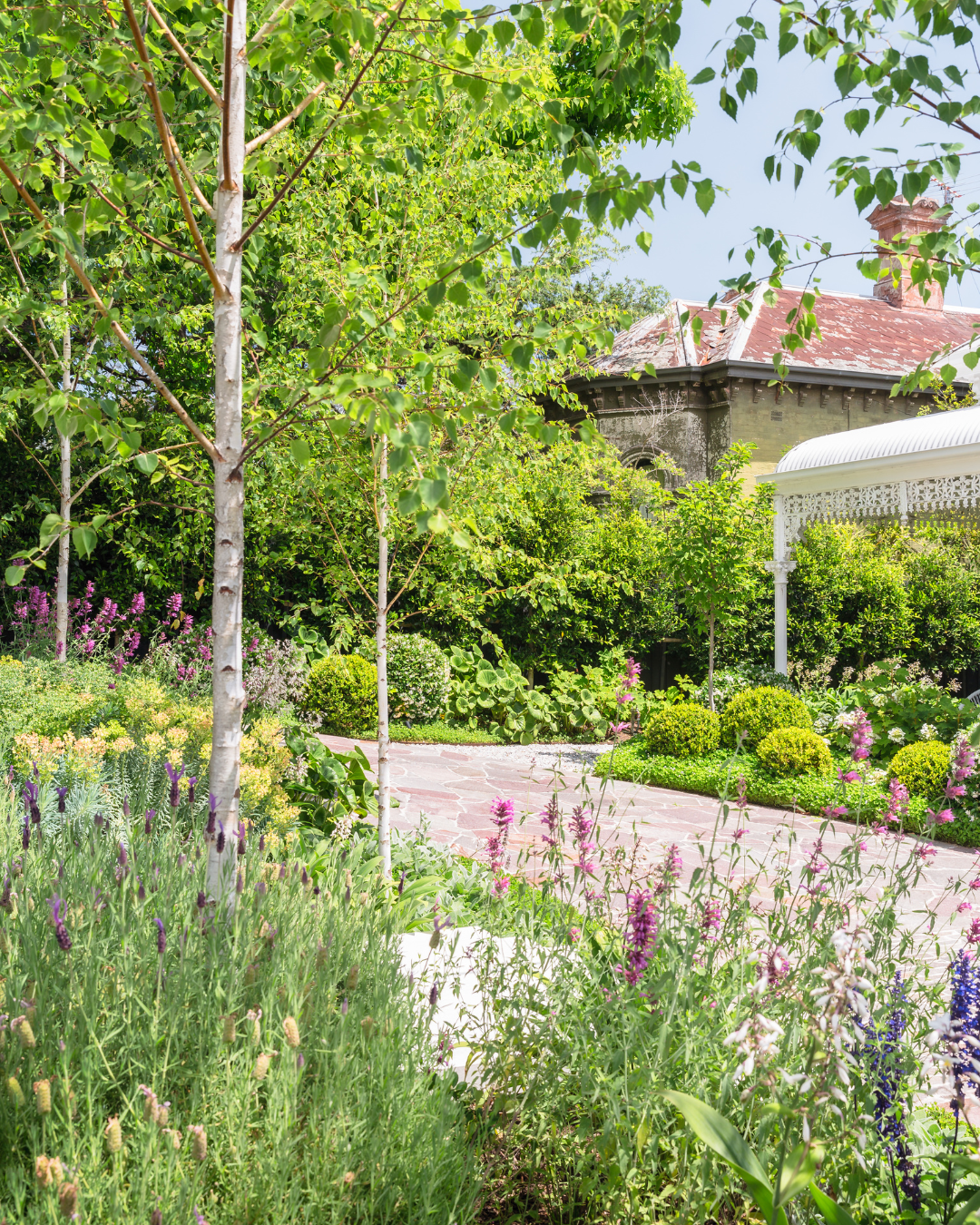A well-thought-out garden isn’t just about selecting beautiful trees; it’s also about choosing the right shapes to complement your landscape design. A tree's form influences a garden's flow, creating a sense of space, focus, and balance. Whether used for privacy, shade or as a striking focal point, tree shapes can have a transformative impact on the aesthetics and functionality of a high-end garden. This article explores how the shape of specific trees, such as Ficus Hillii Flash, Pyrus calleryana 'Capital', and Betula pendula 'Moss White', can elevate your garden design.
The Impact of Tree Shapes on Landscape Design
Tree shapes aren't just an aesthetic choice; they play a significant role in defining the structure and atmosphere of your garden. Different forms create unique visual effects and practical benefits:
- Upright, narrow shapes help maximize space in smaller gardens or create a vertical accent in broader landscapes.
- Broad, spreading canopies offer shade and help soften architectural lines.
- Weeping forms add a touch of elegance, drawing the eye downwards and providing a sense of enclosure.
Selecting the right tree shape can make your garden appear more expansive, provide natural privacy, or enhance the overall harmony of the design. Here’s how these trees can bring out the best in your garden.
Ficus Hillii Flash
The Ficus Hillii Flash is an evergreen tree known for its dense foliage and symmetrical form, making it ideal for creating lush privacy screens or as a statement feature tree. Its glossy green leaves provide a vibrant year-round backdrop, and it adapts well to various pruning styles, whether kept as a tidy hedge or allowed to grow into its natural, rounded shape. Due to its hardy nature, it thrives in different conditions, from sunny spots to partial shade, making it a versatile choice for luxurious gardens.
Key Facts
- Mature Height: Up to 8 meters
- Mature Width: 4-5 meters
- Best Uses: Privacy screen, feature tree, hedge
- Leaf Appearance: Glossy, bright green, oval-shaped
- Rate of Growth: Fast
- Tolerates: Full sun to partial shade, a variety of soil types
Why It’s Perfect to Add to Your Garden
The Ficus Hillii Flash is perfect for homeowners seeking both beauty and privacy. Its dense foliage provides an effective natural screen, creating an intimate garden environment. When pruned, it can be shaped into a formal hedge, adding a touch of refinement, while its naturally rounded shape brings organic elegance to less structured garden designs. Its fast growth rate is ideal for quickly establishing greenery in new or renovated landscapes.
Pyrus calleryana 'Capital'
The Pyrus calleryana 'Capital', commonly known as the ornamental pear, is valued for its upright, columnar shape. Its narrow form and dense branches make it ideal for small spaces where height is desired without compromising ground area. This deciduous tree changes with the seasons, providing an ever-evolving display—from fresh green leaves in spring to stunning white blossoms and fiery autumn foliage. The Pyrus calleryana 'Capital' is a refined choice for a garden that seeks to blend formality with natural beauty.
Key Facts
- Mature Height: 8-12 meters
- Mature Width: 3-4 meters
- Best Uses: Feature tree, narrow garden spaces, formal avenue planting
- Leaf Appearance: Glossy green in spring and summer, turning red and orange in autumn
- Rate of Growth: Moderate to fast
- Tolerates: Drought, a range of soil types, air pollution
Why It’s Perfect to Add to Your Garden
The Pyrus calleryana 'Capital' is perfect for creating vertical accents in formal gardens or adding structure to landscape designs. Its narrow shape allows for creative placement—framing pathways, lining driveways, or adding a dramatic focal point to smaller spaces. The leaves seasonal transformation provides dynamic visual interest throughout the year, keeping the garden alive with color and texture. Its adaptability and low maintenance make it a fitting choice for those who desire effortless sophistication in their outdoor spaces.
Betula pendula 'Moss White'
The Betula pendula 'Moss White', or Silver Birch, is a distinctive deciduous tree celebrated for its elegant, weeping form and stunning white bark. The cascading branches create a gentle, soft aesthetic, perfect for gardens seeking tranquility. Its leaves are delicate, turning from light green in spring to golden yellow in autumn, adding seasonal variation. The striking white trunk starkly contrasts other greenery, making it a standout feature even during winter.
Key Facts
- Mature Height: 12-15 meters
- Mature Width: 6-7 meters
- Best Uses: Feature tree, naturalistic or woodland-style gardens
- Leaf Appearance: Small, green leaves turning golden yellow in autumn
- Rate of Growth: Fast
- Tolerates: Full sun, moist to well-drained soil, cold climates
Why It’s Perfect to Add to Your Garden
The Betula pendula 'Moss White' brings a delicate, natural beauty to any high-end garden. Its weeping branches and iconic white bark add texture and contrast to lush greenery or colorful flowers. It works well in contemporary and traditional landscapes as a feature tree, blending effortlessly with other plantings. The tree’s fast growth rate also makes it a great option for new gardens looking to establish a mature appearance swiftly. Its unique form and year-round appeal make it an elegant addition to any sophisticated outdoor space.
How to Choose the Right Tree Shape for Your Garden
Selecting the perfect tree shape involves understanding how different forms interact with your garden's layout and existing elements. Here are some tips to help guide your choice:
- Evaluate Space and Scale: Choose shapes that match the size of your garden. Columnar forms like Pyrus calleryana 'Capital' maximize height for small gardens without taking up too much space. In larger gardens, spreading forms can fill wide areas with lush foliage.
- Define Garden Zones: Use different tree shapes to create distinct garden zones. For instance, a weeping tree like the Betula pendula 'Moss White' can make a tranquil sitting area, while upright forms frame pathways or entrances.
- Consider Seasonal Changes: Choose trees that offer year-round interest, such as the Ficus Hillii Flash, which stays evergreen, or the Pyrus calleryana 'Capital', which brings seasonal colors and blossoms.
- Think About Maintenance: Some trees require more upkeep than others. If you prefer low-maintenance options, evergreen varieties like Ficus Hillii Flash may be ideal, as they maintain their appearance with minimal effort.
Conclusion
Understanding how tree shapes affect your garden's design is crucial to creating a balanced, elegant, and unique outdoor space. The Ficus Hillii Flash, Pyrus calleryana 'Capital', and Betula pendula 'Moss White' offer distinct forms that elevate your garden’s aesthetic while adding functional value. Whether you're looking for natural privacy, a focal point, or a touch of seasonal beauty, these trees can help you achieve a high-end garden design that is both sophisticated and effortless.
FAQs
-
How do I decide between an evergreen and deciduous tree for my garden?
Consider the desired year-round appearance. Evergreen trees like Ficus Hillii Flash provide consistent greenery, while deciduous trees like Pyrus calleryana 'Capital' offer seasonal interest with changing foliage. -
What is the best tree for creating a natural privacy screen?
The Ficus Hillii Flash is an excellent choice due to its dense foliage and adaptability to different pruning styles. -
How can I add seasonal color to my garden?
Opt for deciduous trees like the Betula pendula 'Moss White', which offers vibrant autumn colors and striking bark that stands out in winter.













